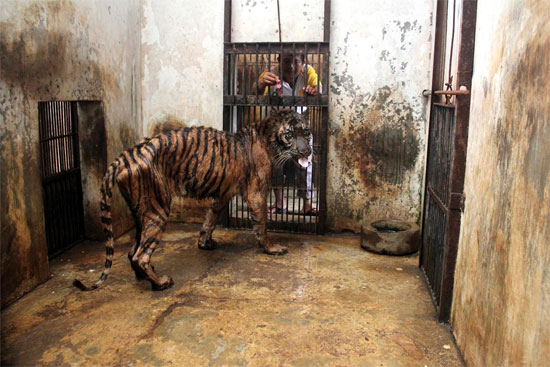Tigers in Indonesia have serious illness
Tigers in Surabaya Zoo, Indonesia, are facing the risk of disease due to poor health and care conditions.
A Sumatra tiger named Melani suffered from undiagnosed gastrointestinal disorders in the last 5 years. Its weight falls from 75kg to less than 60kg. His eyes are deep and only "skin and bones" are found. Melani's disease is a consequence of the zoo's poor condition of care and nutrition.

Melani tiger is suffering from gastrointestinal disease for 5 years being fed by staff. (Photo: AP)
Tony Sumampouw, president of the Indonesian Zoo Association, said that it should be starved for the Melani tiger to die quietly."I think starvation is the best way to end its pain, because its disease is very difficult to cure," Phys.org quoted Tony Sumampouw as saying.
Melani was one of the 10 Sumatran tigers left in the zoo after his death two weeks ago by Rozek, another male tiger. Rozek suffered from 4 years of gastrointestinal disease.
The real cause of the disease the tigers at Surabaya Zoo have not yet been discovered. However, the lack of equipment and medicine makes doctors unable to examine the tigers.
Many Sumatran tigers in preparation for breeding were locked in cramped and cramped cages. All of them are now healthy but they are fully susceptible to infection. Conservation experts are calling on the government and zoo authorities to take safety measures to protect the animals.
Sumatran tiger is the last tiger in Indonesia. Two other tigers in Bali and Java have become extinct in the 50s and 60s of the last century. According to statistics, the number of Sumatran tigers is declining, there are only about 400 left. This species is facing the danger of extinction because of the demand for tiger products in the market.
- Indonesia: Significantly reduced the number of Sumatra tigers and orangutans
- How are predatory tigers?
- The Lord of the Forest is around the world
- Thousands of tigers lost their lives in 10 years
- Legend of the tiger tiger U Minh
- The magnificent, magnificent tiger pictures of Siberia
- Fear for tigers in the year of tiger
- Four white tigers gave birth to four
- The United Nations is concerned about the survival of tigers
- Interesting: Goat raising tigers
- The number of tigers decreased rapidly
- Introducing the world's largest tiger and tiger
 Animal 'suffering' after hibernation
Animal 'suffering' after hibernation Why do goats climb well?
Why do goats climb well? Scientists were surprised to see chimpanzees eating turtles
Scientists were surprised to see chimpanzees eating turtles Giant catfish died deadly due to drought in Thailand
Giant catfish died deadly due to drought in Thailand